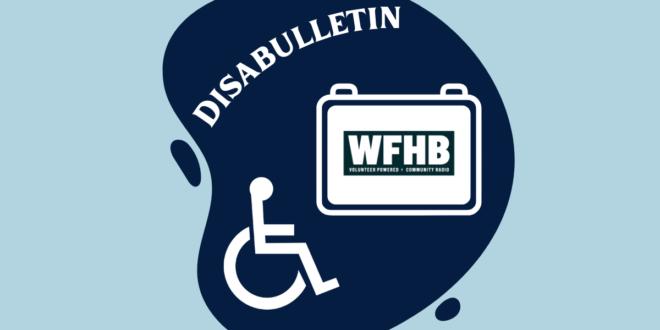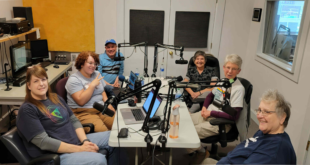Podcast: Play in new window | Download (Duration: 4:38 — 4.7MB)

In today’s Disabulletin, WFHB correspondent Abe Shapiro speaks with Attorney Jeremiah Frei Pearson, about a lawsuit against the rideshare company Lyft over its alleged lack of Wheelchair Accessible Vehicles, or WAV’S. Lyft officials cited a limited supply of Wheelchair Accessible Vehicles and driver availability as reasons why WAV’s are only available to Lyft riders in nine cities across the entire US. To provide more insight on the issue, we turn to part two of an interview with Attorney Jeremiah Frey Pearson of the disability rights group West Chester Disabled On The Move Incorporated.
Shapiro: Just to clarify as well, what specific ADA stipulations or laws would this lawsuit apply to?
Frei Pearson: So they’re violating the Americans with Disability Act, Title II, and there’s a variety of sections within Title II that they’re violating. They’re violating the New York State Human Rights Law. And they’re actually violating the New York City Human Rights Law, even though they provide their best service in New York City. They also intentionally sabotage that service. So what Lyft does in New York City is they make sure they hit the metrics they have to make to not get in trouble with the TLC [New York City Taxi and Limousine Commission]. And as soon as they hit those metrics, they try not to do even a little bit better. And the reason for that is if the metrics are iterative, so if they do better one quarter, they have to do better the next quarter, so they want to just barely pass. So everywhere Lyft operates, it fights against providing good service to people with disabilities. And that’s a mindset that has to change.
Shapiro: And I understand as well, you ran for state assembly two years ago, how did this experience impact your understanding of civil rights, particularly within the realm of civil rights for people in this court case?
Frei Pearson: Honestly, I had a great experience running for office. I didn’t win, but the person who ran, the person who won is a great supporter of this cause. And running for office, you speak with a lot of people and you hear their problems. And so that highlighted to me some of the great unfairness, but I think I knew about it beforehand when we started the lawsuit.
Frei Pearson: But in terms of stories, things that have happened to people because of the failure to serve wheelchair users, two stories stick out to me, one kind of funny, and the other one sad. The one that’s kind of funny is a friend of mine, told me this story, he’s a wheelchair user. So he was I think, in his mid-20s at the time, and he went out with his buddies, they all went out drinking. It’s about 2:30 in the morning, everyone’s intoxicated. Everyone calls a cab and goes home, except my friend Kenny can’t call a cab because there’s no one who serves him. So, he can’t call the Lyft, because he knows they won’t serve him. So, at 2:30 in the morning, when he’s drunk, he’s got to call his mom to come pick him up from the bar. Any of us who’ve been a drunk man in our 20s at a bar wanting to go home at the end of the night, we would not want our mom to be the call we have to make. And if Lyft didn’t discriminate, that wouldn’t be the call.
Frei Pearson: One story that’s mind-blowingly sad to me is another individual, I believe Ansel. Ansel was, I forget exactly where he was. He was wheeling around in his power chair and there was an unexpected snowstorm. So he couldn’t wheel home because of the snow, couldn’t call Lyft, because Lyft refuses to serve him even though as an able-bodied person, I could call it immediately. And there’s no immediate transportation available to him in the town where he was. So after making a bunch of phone calls, he eventually called 911. Even though he had no injury, he was taken to a hospital. And he had to wait overnight in the hospital until the local paratransit could come get him. And then they did and then they took him home. Now, what if Lyft just didn’t have the blocker on? Real good chance that Ansel could have gone to his phone, clicked, and could have had a Lyft ride immediately. And if not, immediately, he would have waited. Instead of spending the entire night in the hospital, he would have waited as long as it took until Lyft could have sent him a WAV. Which, as an able-bodied person, if I’ve got to wait an hour for a car, Lyft gives me that option. It should give that option to people with disabilities instead of assuming that Ansel would rather have no service and spend the night in the hospital when he had no illness. That’s all for this week’s Disabulletin.
Shapiro:Abe Shapiro WFHB news, Live and learn.
In a statement provided to Disabulletin on September 2, a spokesperson for Lyft stated, “Lyft has a long-standing commitment to maintaining an inclusive and welcoming community, and we’re constantly seeking solutions to address WAV supply challenges.”
 WFHB Bloomington Community Radio
WFHB Bloomington Community Radio


